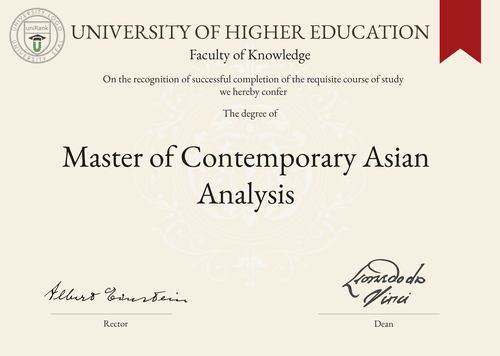
Master of Contemporary Asian Analysis (MCAA)
Guide to Master of Contemporary Asian Analysis Program/Course/Degree
Master of Contemporary Asian Analysis (MCAA)

Program Name:
Master of Contemporary Asian AnalysisProgram or Degree abbreviation:
MCAADuration range:
Varies by country and universityTuition range:
Varies by country and universityOverview:
The Master of Contemporary Asian Analysis (MCAA) program is designed to provide students with a comprehensive understanding of contemporary Asian issues. It offers a multidisciplinary approach, combining social sciences, humanities and cultural studies to analyze the political, economic, social and cultural dynamics of Asian countries.Curriculum Overview by year:
The curriculum is structured to provide a deep understanding of Asian societies, politics, economies and cultures. The program typically includes courses such as Asian history, international relations in Asia, Asian languages, Asian literature and contemporary issues in Asian societies. Students may also have the opportunity to engage in fieldwork or internships in Asian countries.Key Components:
- In-depth study of Asian societies, politics, economies and cultures - Multidisciplinary approach combining social sciences, humanities and cultural studies - Language courses to enhance communication skills in Asian languages - Fieldwork or internship opportunities in Asian countriesCareer Prospects:
Graduates of the MCAA program can pursue various career paths. They may find employment in international organizations, government agencies, non-profit organizations, research institutes, or multinational corporations. Career opportunities may include roles in diplomacy, policy analysis, research, consulting, or cultural exchange programs.Salary Expectations:
Salary expectations for MCAA graduates can vary depending on factors such as the chosen country, industry and level of experience. Generally, professionals in this field can expect competitive salaries, especially in roles that require specialized knowledge of Asian affairs. For a more accurate understanding of salary expectations, you can utilize the Job Sites Search Engine, from our sister site jobRank, which searches over 4,600 job sites worldwide. Make sure to specify not only the job title but also the country you are interested in.Conclusions:
It is important to note that the duration, tuition fees, curriculum, key components, career prospects and salary expectations of the Master of Contemporary Asian Analysis program can vary depending on the country or location where the program is studied, as well as the chosen university. Prospective students are encouraged to research and compare different universities and countries to find the best fit for their academic and career goals. Visitors interested in pursuing the Master of Contemporary Asian Analysis degree can use the uniRank World Universities Search Engine to find universities offering this program anywhere in the world. This search engine provides a comprehensive database of universities and allows users to filter results based on specific criteria, such as program availability and location.World Universities Search Engine
search for Master of Contemporary Asian Analysis (MCAA) and add the Location (country, state etc.) or specific University you are interested in studying at.
Query examples:
- Master of Contemporary Asian Analysis (MCAA) United States
- Master of Contemporary Asian Analysis (MCAA) United Kingdom online
- Master of Contemporary Asian Analysis (MCAA) Australia international students
- Master of Contemporary Asian Analysis (MCAA) University of California
- Master of Contemporary Asian Analysis (MCAA) University of London tuition fees
- Master of Contemporary Asian Analysis (MCAA) University of Sydney scholarships
Share Program/Course
Interesting? Share this program/course/degree info with your friends now.